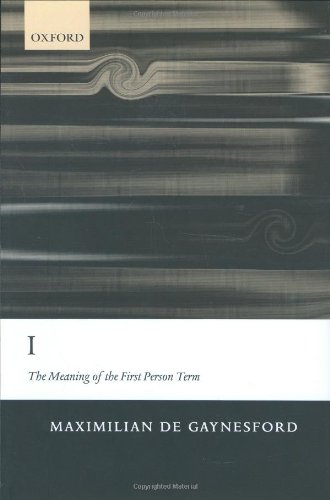

Most ebook files are in PDF format, so you can easily read them using various software such as Foxit Reader or directly on the Google Chrome browser.
Some ebook files are released by publishers in other formats such as .awz, .mobi, .epub, .fb2, etc. You may need to install specific software to read these formats on mobile/PC, such as Calibre.
Please read the tutorial at this link: https://ebookbell.com/faq
We offer FREE conversion to the popular formats you request; however, this may take some time. Therefore, right after payment, please email us, and we will try to provide the service as quickly as possible.
For some exceptional file formats or broken links (if any), please refrain from opening any disputes. Instead, email us first, and we will try to assist within a maximum of 6 hours.
EbookBell Team

4.4
52 reviews
ISBN 10: 0191537042
ISBN 13: 9780191537042
Author: Maximilian de Gaynesford
I is perhaps the most important and the least understood of our everyday expressions. This is a constant source of philosophical confusion. Max de Gaynesford offers a remedy: he explains what this expression means, its logical form and its inferential role. He thereby shows the way to an understanding of how we express first-personal thinking. He dissolves various myths about how I refers, to the effect that it is a pure indexical. His central claim is that the key to understanding I is that it is the same kind of expression as the other singular personal pronouns, you and he/she: a deictic term, whose reference depends on making an individual salient. He addresses epistemological questions as well as semantic questions, and shows how they interrelate. The book thus not only resolves a key issue in philosophy of language, but promises to be of great use to people working on problems in other areas of philosophy.
Introduction
PART I: Questions about the Meaning of I
1. Historical Background
To what does I refer?
Is I a name?
Is I a descriptive term?
Is I a (Pure) Indexical?
2. Questions of Reference
What is Rule Theory?
What is the simple rule?
What does the simple rule mean?
What does the simple rule determine?
What is the context?
What role does the simple rule have?
3. Questions of Expression
What is Independence?
Is Independence to be preferred?
What does Independence explain?
Is Independence necessary?
What does Independence imply?
4. Questions of Logic
What is The Guarantee?
What does The Guarantee explain?
Is The Guarantee supported?
Why has The Guarantee seemed convincing?
5. Interim Conclusion
Summary
Purism
An alternative conception
PART II: The Meaning of I
6. Logical Character
How I behaves in substitution instances
What matching constraints reveal
7. Inferential Role
How the inferential roles of variant terms are distinguished
What is required for the validity of I-inferences
How the referential character and inferential role of I are related
8. Referential Function (I)
What referential function requires
What demonstration is
Why demonstration is not the determinant
9. Referential Function (II)
What is distinctive about Deictic Terms
What referential salience is
How the reference of I is determined
What has impeded appreciation of I's deictic character
10. Expressive Use
How deictic reference is discriminated
How the reference of I is discriminated
What forms of attention are required
11. Communicative Role
What communicative role requires
What roles demonstration plays
Why the attentive tasks can be easy
12. Conclusion
Summary
Contrast with the leading theory
Where the findings lead
Appendix 1: Analytic Table of Contents
Appendix 2: Recurrent Terms of Art
References
Index
in the first person meaning
i'm the first person you're the second person
what's the meaning of first person
meaning of first-person
person-first terminology